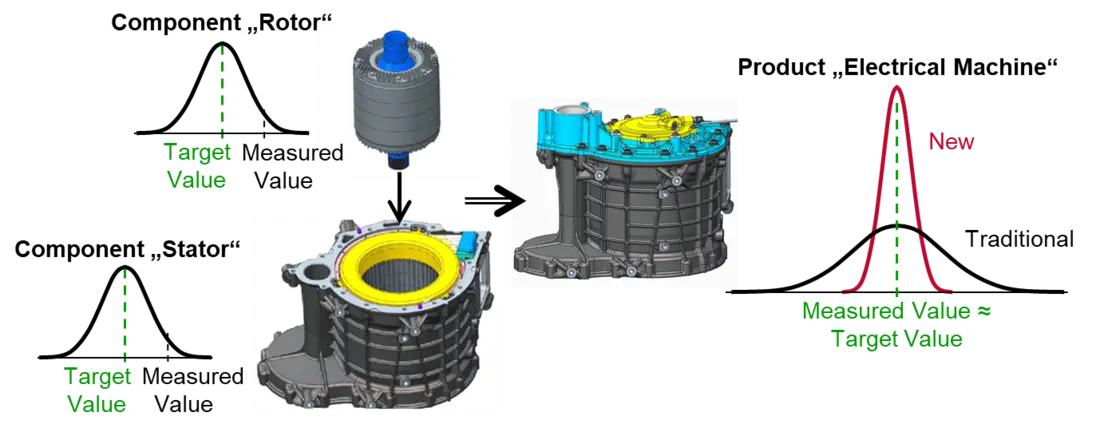Focus:
- Electrical drive train simulations
- Analysis of real manufacturing data with machine learning approaches
- Data driven selective assembly in the production of electrical drivetrains
Summary:
In the field of production and assembly, for example of vehicles, traditionally the following basic approach applies: Target values and tolerances are specified for the manufactured product as well as for its individual components. They define the permissible value ranges for geometric dimensions, electrical properties, etc. Accordingly, the manufacturing and assembly processes have to be dimensioned with sufficient precision. If a product or one of the components still does not comply with all tolerances, it must be reworked or discarded. In tolerance specifications, the pairing of components usually remains unlimited. In return, however, the permissible value ranges are restricted to worst-case component combinations.Ensuring sufficient process accuracies as well as reworking components comes along with additional expenses (e.g. more complex plant design, additional manufacturing steps for error correction). In case of discarded components, the associated production progress gets lost as well, meaning that all manufacturing and assembly work already carried out becomes worthless. The additional expenses or losses in production intensify by static tolerances designed for arbitrary component pairings.The research project aim is to extend the classical manufacturing approach with specifically selected, dynamic component combinations. Thus, a selective assembly concept shall be realized based on the available production and measurement/ test data. One possible benefit is tolerance compensation among the components of a final product, without changing individual manufacturing and assembly processes. This supports consistent product quality, on the one hand. Furthermore, the proportion of discarded components is reducible. The development of the data-driven selective assembly concept makes use of an existing electric vehicle drives production. A research focus lies on evaluating real manufacturing data through machine learning processes. In addition to the data-driven approach, the component interactions in an electric drive train are investigated via simulations.

Contact
Prof. Dr.-Ing. Christian Endisch
Phone: +49 841 9348-3368
Room: S 426 (Stauffenbergstr. 2a in the DK building)
E-Mail: els@thi.de


![[Translate to English:] Logo Akkreditierungsrat: Systemakkreditiert](/fileadmin/_processed_/2/8/csm_AR-Siegel_Systemakkreditierung_bc4ea3377d.webp)








![[Translate to English:] Logo IHK Ausbildungsbetrieb 2023](/fileadmin/_processed_/6/0/csm_IHK_Ausbildungsbetrieb_digital_2023_6850f47537.webp)


